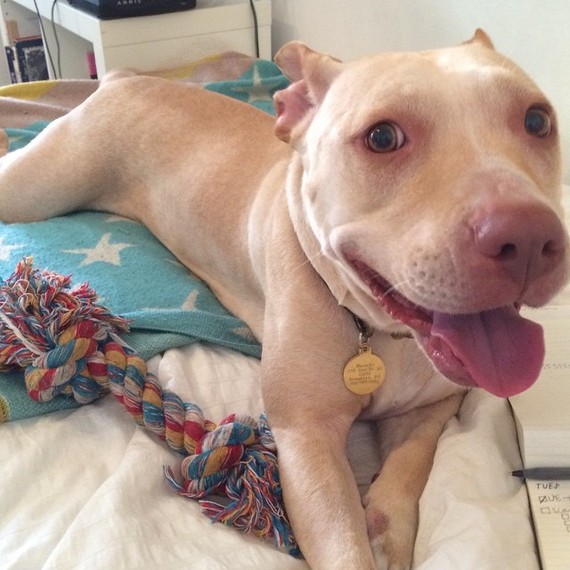About a month ago, I adopted a dog. Now -- a month later -- I'm still rescuing that dog.
Bambi, my beautiful two-year-old pup, is a Pit Bull mix. The implications of rescuing a Pit Bull are great -- and widespread. (And I am not using "great" in the good way.) Before taking Bambi into my home, I was ready for the wide array of problems new rescues often have -- I put my shoes on a higher shelf, moved toxic cleaning products into closed cabinets, and let the upstairs and downstairs neighbors in my apartment know about our new roommate.
What I was not expecting, and what I was not ready for, was The Great Pit Bull Bias. As a dog lover -- worshiper, even -- I was aware that pitties have a bad reputation. But I never bought into the hype. In my experience, then and now, I've found dogs to be exceedingly trainable. Dogs owe their existence to humans and, as such, are malleable to their humans' needs. And, while I think it's a safe assumption to say that most people -- dog owners or not -- believe that most dogs are trainable, the same doesn't apply to Pit Bulls.
Since rescuing Bambi, I have gotten more dirty looks than ever before. On an average walk, anywhere between four and 10 people cross the street when they see us coming. Growing up owning dogs, I've become accustomed to comments like, "Beautiful dog!" and questions like, "Can I say hi?" This has happened only twice since I've taken Bambi in -- and we walk miles around south Brooklyn everyday.
People say that Pit Bulls are killers -- that they were bred to fight. The truth? The aggression grade given to the American Pit Bull Terrier, according to ATTS (American Temperament Test Society, Inc.) which tests for dog-to-human aggression, is 86.8 percent. That's just a hair above the Golden Retriever -- which tested at 85.2 percent.
That said, breeds are predisposed to certain traits -- just as they are to particular health problems. Bulldogs have skin ailments. Labradors love everyone. Pit Bulls are aggressive towards other dogs. Are all of the aforementioned statements true all of the time? Of course not. But, just as someone adopting a Bulldog needs to be ready to deal with their possible health problems, someone rescuing a Pit Bull needs to know that socialization training may be necessary.
Pit Bull puppies, adopted and socialized as youngins, are no more dangerous than any other breed. Unfortunately, however, I didn't adopt Bambi as a puppy. I adopted Bambi at two years old -- after having been abandoned (tied to a fence in Crown Heights, Brooklyn), abused and taken away from her puppies. When I first got Bambi, she was still producing milk.
Had she not been taken in by a family that spayed her, vaccinated her, and found her a suitable home she would have been put down immediately.
Bambi was not a fighting dog, but she may have been used to breed them. Her scraped elbows and cigarette-burned skin are reminders of her past -- as are her territorial tendencies. After having Bambi for a few weeks -- once she became comfortable in my home and with me -- she began displaying aggressive behavior towards strangers coming into my apartment. I don't want her bad behavior to speak for the breed -- rather, to behavioral issues born from neglectful and abusive homes.
More than that, though, I don't want her to have any bad behavior. I want her to help fight The Great Pit Bull Bias. I want Bambi to be an ambassador for the breed. It's hard to believe that the same pup that lets me sit her on my lap as if I were a mall Santa, also charges at strangers coming into the home. But Bambi is good. She is obedient, affectionate, housebroken -- she just has one behavioral issue. But it is a big one -- and one that cannot go unfixed. So I coughed up the fee for an initial behavioral consultation with a fabulous NYC trainer who came recommended from Pit-owners. She agrees -- Bambi can be rehabilitated. But she'll need a couple additional training sessions and, of course, a commitment from me to work as hard as I possibly can to get her to where she needs to be.
But I love Bambi. And Bambi loves me. And, after just one training session, she's making great progress. We work together everyday.
So I continue to save the money necessary for the remaining training sessions just as I continue to dedicate my time and effort. Both are necessary to finish rescuing Bambi. Because the truth is -- she needs it. There is no future for Pit Bulls with aggression problems. The Great Pit Bull Bias means that Bambi needs our help in order to live.
I'm stressed. I'm scared. I'm nervous.
I'm also confident -- in Bambi and in myself.
